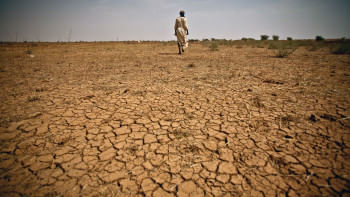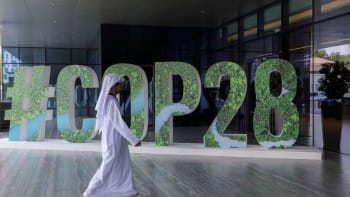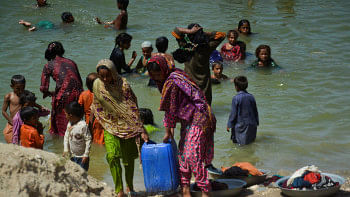Without proper follow-up, what is the point of COP28?

Last year at COP27, there was a phrase going around: "You broke it, so you fix it." At COP28 this year, we're here to ensure this happens. As delighted as I was last year that a fund was announced, the actual implementation process is yet to be defined. This year, attendees are looking forward to knowing more regarding "global stocktaking," and it is past high time to do so. We have our eyes on the countries that are being affected the most by the climate crisis, and the countries that are contributing the most to it. However, it seems that we are caught in an ideological fight, going back and forth between questions of historical responsibility and national response.
We don't have the time anymore, and we, as the climate action community, are tired of saying this ad nauseam. Compensation is still non-existent, and contributions are being "greenwashed" through existing projects and commitments, thereby not actually creating any new funds and having no net effect. This will not do. Almost 30 years into the COP, we've found fresh dilemmas, but not enough action. We witnessed how the terminology shifted from phase-out to phase-down last year, and now the support for fuel industries has been doubled. According to the International Monetary Fund, globally, fossil fuel subsidies were $7 trillion in 2022, reflecting a $2 trillion increase since 2020 due to government support and surging energy prices because of multiple wars across the world.
The climate justice alliance calls for a review of this consensus-based systemic barrier to reaching and ensuring timely decisions, which are a must during this climate breakdown. When parties remember their bilateral and multilateral agreements and their agendas follow the lowest-common-denominator strategy, it often compels them to agree to decisions while sacrificing their own priorities. Without naming names, everything that is discussed days prior gets vetoed and is turned to naught. COP, then, almost three decades in, has become a dispute between environmental science and economic and political agendas.
The OECD reported recently that climate finance by developed countries reached $89.6 billion in 2021. The report also indicated that the accumulated sum is likely to have exceeded the $100 billion goal in 2022. However, by 2022, two years after the 2020 deadline set at COP15 to hand over the funds, none of it had been disbursed.
There is also a growing concern about the quality of finance and transparency related to the delivery and utilisation of climate funds. If I refer only to Bangladesh, in the National Adaptation Plan, developed in 2022, an appraisal of the cost of the 113 interventions (including 90 high-priority and 23 moderate-priority ones) amounted to an investment equivalent to $230 billion for 27 years (2023-2050), an implementation period that runs until the 13th Five Year Plan cycle of Bangladesh. But we are yet to see if anything has or will come of this.
Political and economic agendas do not exist on a separate plain from climate concerns. The environment—the very planet we live on, the air we breathe, the water we drink—cannot be one item in a list of things to get around to fixing. Saving our environment has to be the overarching default; the mainstream. We cannot go from one COP to another as if each iteration was a figment of our imagination, starting afresh every time.
At COP28 this year, I am hoping, perhaps despite myself, for a discussion that will be more honest, open, self-reflective, and (most importantly) action-oriented. I believe the global stock-taking report from this year's COP, alongside the Intergovernmental Panel on Climate Change's Sixth Assessment Report will convince political leaders to refresh their commitment to be coherent and transparent in order to be accountable to the next generation.
Even with a keen eye on negotiations, I understand how much harder it is to do than it is to say. That table is an immense bottleneck, and always has been, but we cannot simply state something and wave it away for another time. There is no other time than now.
This is precisely why policy and action have to go beyond governments, which likely will not, and sometimes cannot, act alone without support from private organisations, civil societies, and even UN bodies. Without involving these non-state actors, we are using only a fraction of the resources available to us.
Alongside this, we have to ensure that funding channels are free of red tape and complexity. Convoluted protocols and procedures in banking and financial sectors are an unnecessary clot that is stalling the process.
Solutions for socio-economic problems already exist. Interventions for every demographic—minorities, women, children, the handicapped, and the socioeconomically marginalised—do not exist in a vacuum. They are all interconnected, and the solutions, therefore, have to be integrated, robust, and holistic. Climate change has to weave through and be a part of every other solution—and not be a peripheral concern. All the provisions need to be adapted to account and adjust for the environment, in order to not be a wasted effort. Given how human rights are silently impacted due to climate change consequences in many parts of the world, we need to revisit the Universal Declaration of Human Rights and other global commitments to ensure the required modification for a just world.
Moreover, the climate adaptation and mitigation solutions that do exist are often neglected in the search for a bigger, "better" solution. We cannot wait for big solutions when locally-led interventions can do more with less—more effectively and faster. The crisis plaguing our climate, unlike a nation's political, social, economic, or logistical crisis, is a universal one. None of us are alone in this, and have to act together. No blame, no claim. Let's take responsibility.
Kazi Amdadul Hoque is the senior director and head of Climate Action at Friendship, a social purpose organisation.
Views expressed in this article are the author's own.
Follow The Daily Star Opinion on Facebook for the latest opinions, commentaries and analyses by experts and professionals. To contribute your article or letter to The Daily Star Opinion, see our guidelines for submission.


 For all latest news, follow The Daily Star's Google News channel.
For all latest news, follow The Daily Star's Google News channel. 












Comments